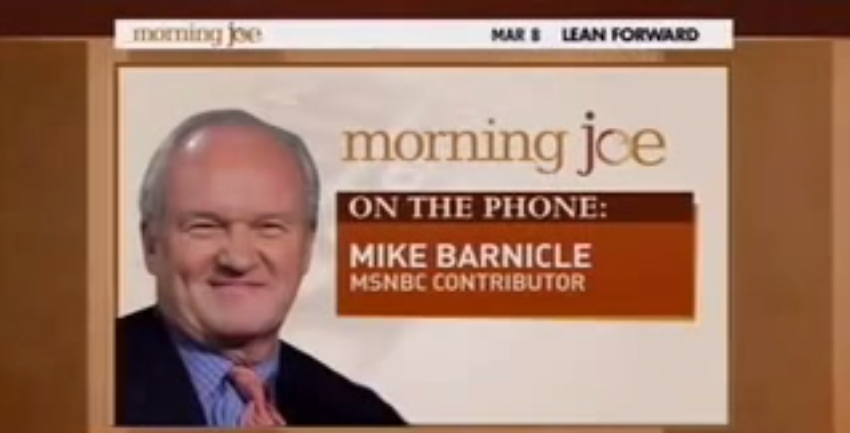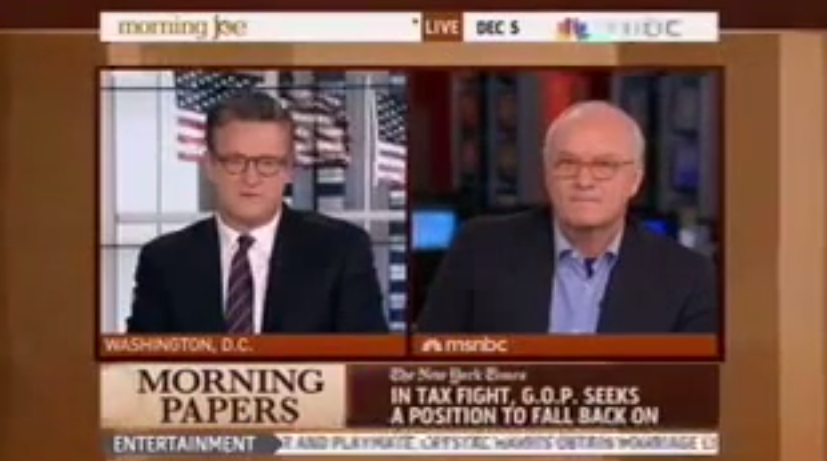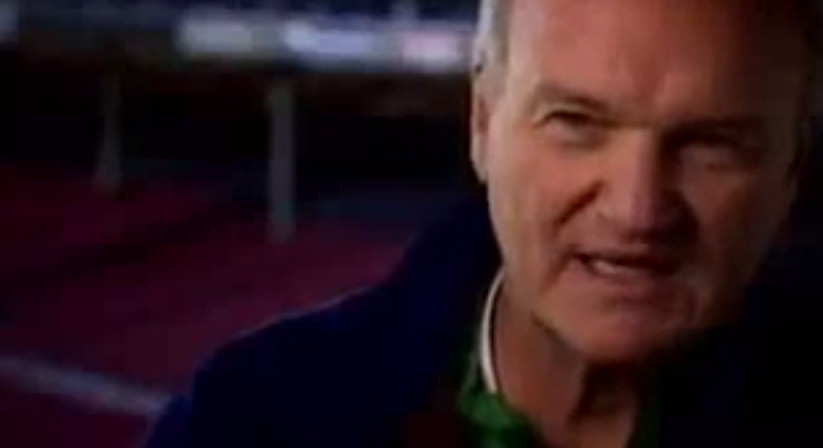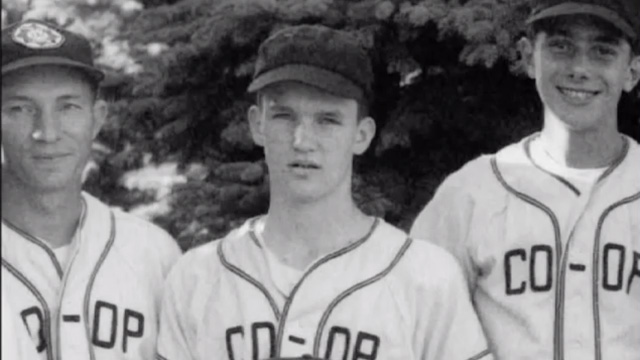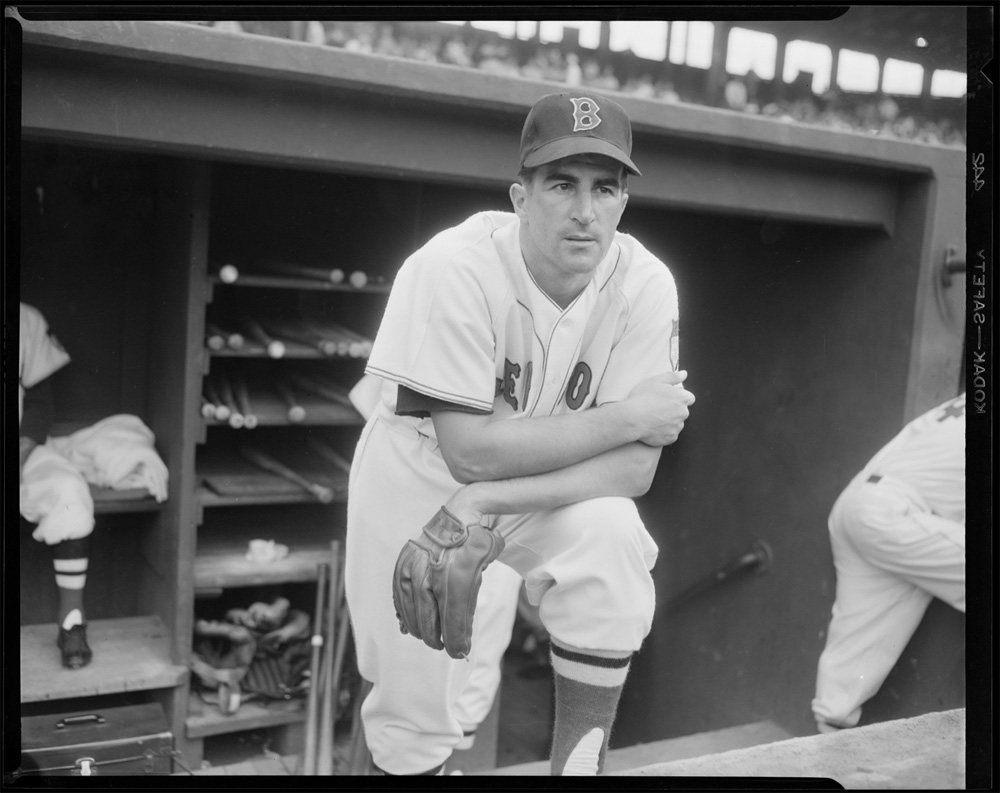Mike Barnicle banters with the Morning Joe team about Boston Red Sox spring training during a segment of The Sideline.
Category: Barnicle on Baseball
Mike Barnicle Commenting on Free Agent Status | Morning Joe
Mike Barnicle discusses free agent status on Morning Joe
Inside Iconic Fenway Park
Mike Barnicle speaks about the magic of Fenway Park, and the iconic stadium’s hold on the people of Boston in “Inside Fenway Park: An Icon at 100 Part II”
THE TENTH INNING | Mike Barnicle: “Don’t lose your stuff” | PBS
Mike Barnicle talks about the baseball gloves he’s had since 1954.
“The Tenth Inning,” is a two-part, four-hour documentary film directed by Ken Burns and Lynn Novick. A new chapter in Burns’s landmark 1994 series, BASEBALL, “The Tenth Inning” tells the tumultuous story of the national pastime from the 1990s to the present day.
A Believer’s Baseball Hymn
Originally published March 22, 1998, by Mike Barnicle for The Boston Globe
He arrived on the job early the other morning, carrying the same items he’s lugged across more than six decades of employment in a boy’s game: a bat, a ball, and an infectious smile on his 79-year-old face.
“First time I met Ted Williams?” Johnny Pesky said, repeating a question. “1937. I was the clubhouse kid in Portland and Ted was playing for San Diego of the old Pacific Coast League. I was 17. He was 19. We’ve been friends ever since.”
The old man stood in front of his office — a locker filled with a uniform, cigars, T-shirts, and his ever-present work tool, a fungo bat — as he peeled away the years between his major league debut in 1942 and a day last week when he conducted practice for a few children, some younger than Pesky was when he got his first baseball paycheck in 1930 for shining shoes. He was the son of immigrants struggling through the Depression in a country mesmerized by a perfect game.
“My parents were sticklers for discipline,” Pesky was saying. “Other scouts offered more money, but my mother told me, `No. You sign with Boston’ because their scout was very polite. She made a good choice for me. She sent me to heaven.”
Pesky represents a glorious past, the grand history of a great game now threatened by greed, selfishness, and amnesia. Most of today’s players are in uniform for the money, mercenaries with no sense of tradition and even less loyalty.
It is spring 1998, a fantastic time of instant communication and computer magic. Yet, with each new invention and every bold step into the future, we lose a bit of our legacy. In an age of e-mail, digital cell phones, and pagers, fewer communicate by tongue, telling stories that paint a proud picture with details often omitted on the screen of some PC. Stored memory has nearly been eclipsed by electronic skywriting.
“We’re playing the Yankees one day in 1942,” Pesky recalled. “It’s a 1-1 ballgame going into the bottom of the eighth. Spud Chandler’s pitching for them, a mean guy.
“That year, I was nothing-for-16 against Chandler. I mean, I couldn’t hit him to save my life, and I’m up third. Ted comes over to me in the dugout and says, `Listen, you dumb little so-and-so, the reason you can’t hit Chandler is you’re trying to pull the ball on him. I can’t even pull it on him, and look at the difference between you and me: You’re a midget.’
“I come up with two outs,” Pesky continued. “I run the count to one and one, and I see Red Rolfe at third base for the Yanks, he’s way in on the infield. Ted’s in the on-deck circle, and he’s screaming, `Go with the pitch, stupid.’ So I do, and I line a single into left over Rolfe’s head.
“Ted comes up and Chandler is screaming at me; you wouldn’t believe the things he’s calling me. Then he turns and starts pitching to Williams. Well, he grooves one and Ted hits it 30 rows up in the bleachers and he’s taking his sweet time coming around the bases, too. By the time he crosses the plate, I’m already back in the dugout and everybody’s congratulating Ted. I’m sitting there like Joe Nobody when Ted finally comes over with this big grin, and I looked at him and said, `You know, you never even would have got up if I hadn’t gotten my hit, and the only reason you got the pitch you did was because Chandler was so mad at me he forgot about you.’ Boy-oh-boy, let me tell you, that seemed like it all happened yesterday.”
No other game lends itself to stories, to tall tales and true tales, to the very history and social fabric of the country, as much as baseball does. And on a warm Florida morning, standing on emerald grass beneath a blue sky, surrounded by a half-dozen kids eager to shag flies and chase grounders, Johnny Pesky’s recollections assume the gentle tone of a hymn because they are woven by a man filled with a faith so few hold today: a belief in his game and everything it has given him.
“My brother out in Oregon still lives in the same house Mr. Yawkey bought for us in 1942 after I signed with the Boston Red Sox,” Johnny Pesky proudly stated. “The house is near the same church where my father took me to 11 o’clock Mass on the Sunday I returned from the war, wearing my dress whites. He insisted we walk right down the center aisle so all his friends could see me, because he was prouder of the fact that I wore that uniform than any other. Boy, it’s been a great life, I’ll tell you that.”
Then, he grabbed his fungo bat and called to the kids who assembled about him as if he were a Pied Piper in crimson hose. They all knelt on the grass as Johnny Pesky, 79 and younger than most, began telling stories they will never forget about an admirable life and a marvelous game.
###
(Image:Courtesy of the Boston Public Library, Leslie Jones Collection.)
Baseball’s Timeless Beauty
“…your baseball glove. It’s got a soul, a memory all its own, and a future that never fades because it has never let go of the grasp the past has on you and so many others.”
Extract taken from Mike Barnicle’s “The Timeless Beauty of Baseball.”
THIS COULD BE THE WEEK FOR A SOX TITLE
Originally published April 4, 1980, by Mike Barnicle for The Boston Globe
The Red Sox, behind the 32hit pitching of Mike Torrez and the hot bat of Stan Papi, clinched the 1980 American League East title yesterday before a crowd of 612 fans at Fenway Park. The 1914 victory over the Detroit Tigers enabled the team to finish the strike shortened season with a record of 12 wins and 4 losses, resulting in Boston’s first division title since 1975.
“You can name a lot of guys responsible for this thing,” Tommy Harper, the Red Sox manager, said. “But in the end, it came down to one thing, one big thing: the season was too short for us to choke.”
Harper, the first Red Sox manager to weigh less than 150 lbs., is a strong contender for American League Manager of the Year award. He assumed the job during the Patriots Day All Star break when Don Zimmer was fired after the team lost two straight games.
“I don’t want to knock anyone who came before me,” Harper was saying yesterday. “But this club would have done a lot better through the years if there was no September.
“These kids were always under a lot of pressure in September. You could see it in their throats,” Harper said. “Now with this new schedule, you start on April 14 and finish on May 23. A club like this one has a great chance with something like that. We always get off to a fast start. Thank goodness for the Players’ Association: they’re responsible for this pennant.
“I am sorry for a guy like Yaz though. He might retire and if we had played a full season, he was going to get a boat in Minneapolis and a car in California when they had days for him there. Now he gets nothing and that’s not what this game is all about.
“We had a great season though,” the manager said. “Injuries weren’t a factor except for Eckersley’s constant nose cold. We got a couple breaks in the schedule. And we got hot at just the right time when we reeled off those three straight wins against Toronto.”
“I’m sorry to see the year come to an end,” Red Sox Captain Carl Yastrzemski said. “I’m going to miss all that meal money that management would have to have given us if we played the full season.
Torrez, the hardthrowing righthander, came through with his third victory of the season against the young Tiger team. Luck was on the side of the Sox however as the game was completed in less than 180 minutes. Torrez, under his contract, does not have to work more than a three hour day.
“Where’s my free beer?” the ace of the staff was yelling in the middle of the clubhouse celebration. “Next to your free shoes,” it was pointed out.
“What free shoes?” Jim Rice demanded. “Torrez gets free shoes and I don’t? What’s going on here anyways?”
The game was nearly lost in the bottom of the seventh inning. Burleson led off with a sharp single to left. After Jerry Remy flied out to deep left field, Fred Lynn doubled to right, scoring Burleson and tying the score at 10.
Rice then lashed a line drive single to right. Lynn stopped at third despite being waved home by third base coach Eddie Yost.
“Under my contract, I don’t have to run hard until after June 15th,” Lynn explained later. “If I do put out before then, the club has to reimburse me if I sweat or if I breathe hard.”
Lynn scored when the next batter, Carlton Fisk, hit a one handed fly to Tiger centerfielder Kirk Gibson. The rookie outfielder was busy at the time working out an agreement for a series of beer commercials and the ball skipped past him all the way to the edge of the cinder track.
“Those are the breaks,” Gibson’s lawyer said. “He’s upset about that but the commercials are a great opportunity for him.”
“Gibson’s going to be a great one,” Tiger manager Sparky Anderson said. “The kid can do everything: TV, radio, print ads, everything.”
“It’s been a long, long year,”said Steve Renko. “I’m sure that most of the players are sorry to see the season end though because it’s been a great one.
“It’ll give us a lot of things to look back on while we’re home striking this summer. A lot of pleasant memories.”
Renko, who hurled four complete innings over the course of the 1980 season, pointed out that the players did not really want to walk out. “It was forced on us,” the pitcher said.
He pointed out that the average salary for a major league ballplayer in 1979 was only $113,000. In addition to this, management now wants the right to be compensated for players who leave a team for more money elsewhere.
“The owners just want to make baseball like all the other pro sports,” Renko said. “Just because basketball and football and hockey all have compensation doesn’t mean we should have it. Baseball players are different.”
Outside the ballpark, 12 fans stood in the darkness, celebrating the title. Inside the clubhouse, the ballplayers were putting slugs in the pay phone as they tried to find a restaurant owner willing to pick up the tab for a victory celebration. They all wanted to go someplace where no tipping was allowed.
###
A PLAGUE ON THEM ALL
Originally published June 15, 1981, by Mike Barnicle for The Boston Globe
Why should we get upset because a bunch of guys averaging around $150,000 in salary for seven months work now claim their bosses are unfair? How can you feel sympathy for bosses who, as a group, should be given “The Dummer of the Decade” award for the way they have helped destroy baseball?
This baseball strike is like a war between Hitler’s Germany and Joe Stalin’s Russia: you don’t know whom to root for. It’s like a debate between Idi Amin and Castro; a fistfight involving Howard Cosell and Tom Snyder.
Both sides look like sleazes.
The players are like 16yearold rich kids who get everything they want and a lot they never asked for. If the kid wants to go swimming, the parents buy a mansion next to the beach. When the kid says his feet hurt, a Mercedes shows up in the driveway.
And the owners are like all those whacko rich parents you read about: they open up checking accounts for their children when they reach the age of seven, give them cars and $15,000 for gas money, and apologize when little Dexter throws a tantrum after he is asked to sweep up all the cocaine on the floor of his bedroom.
But the root of the strike is truly American. It all began in a courtroom. Everything in this country now either begins or ends in front of a judge.
The whole nation is one big legal mess: from busing to baseball, from marriage to municipal employment, human beings no longer talk to each other without the aid and encouragement of those modern robber barons called lawyers.
Without the consent of a hocuspocus industry called the law, kids cannot pray in school, parents cannot do what they feel is best for the health of a daughter, and the list goes on and on. Why should sports be different?
A few years ago, a couple of ballplayers who had grown tired of being treated like property did not sign new contracts with their teams. The courts agreed with them when the ballplayers claimed they were free to sign with anyone willing to pay for their services. The owners fought this for a bit, and then they fell in love with the concept.
Soon, mediocre banjo hitters and pitchers unable to break a pane of glass with their fastball were on the open market. Not owned by any club, they went with the highest bidder.
The bidding is ridiculous. It helped make the sport a joke while putting huge sums into players’ pockets. Human nature and common sense dictate that when one man offers you a million dollars to cross the street while another man says he’ll give you a dime to stay where you are, you cross the street.
The players took the money. If they did not, they would have become candidates for a lengthy stay at the Menninger Clinic.
The owners have been turning profits for years off the backs of players and those naive fans who thought baseball was still a sport instead of the tax gimmick it is today. Owners could get through the year better without nine healthy ballplayers than they could without an accountant.
Now, having witnessed the almost ludicrous spiraling of costs, the owners are asking the players to help them stop the madness. “Please make us stop handing out money,” the owners are saying to the players.
Tell me it is not a great country when a Skip Lockwood is handed half a million bucks to prove that he can not play baseball. Without stupid owners, he would have been a greenskeeper five years ago.
Tell me we are not living in a screwedup society when Dave Winfield gets $20 plus million from the Yankees to play a game. And tell me you wouldn’t take the money and run if it were offered to you.
All of it is more than enough to make you sick.
The players have wealth, opportunities, and marvelous and hard won benefits, and yet they cannot sit in a room with management to work things out. And the other side, truly a collection of snakes, makes money hand over fist through sophisticated writeoff schemes and tax shelters and still has the gall to act like the injured party when, in fact, it started the madnesss.
Both sides stink. Both are bums.
Both have forgotten where their livelihood comes from: the poor stiff who, until recently, thought the bible of baseball was The Sporting News and not the minutes of the National Labor Relations Board.
The bottom line is that a bunch of bungling lawyers, a bunch of spoiled ballplayers, and a bunch of arrogant chiselers who think of baseball as a business first, last and forever have stolen our summer. They made a game into a legal brief. They took a nice, soft, pleasant part of America and turned it into a big, fat headache.
###
FROM ME TO MA BELL: BOO!
Originally published August 19, 1981, by Mike Barnicle for The Boston Globe
This is a story about a little league baseball team, the Parkway All Stars of West Roxbury and Roslindale; two big league guys, Paul Nicholson and Frankie (Ballgame) Long; and a bush league company, New England Telephone. It will just take a couple minutes to tell.
Nicholson and Long work for the phone company. The two men are service representatives in the Brookline business office. They both live in Roslindale and manage the Tigers in the Parkway little league.
Both guys are nuts about baseball. As a matter of fact, Nicholson, every summer on his vacation, drives his family to Williamsport, Pa., for the Little League World Series. That’s 400 miles one way.
This summer, the Tigers won their regular season division with a record of 17 and 3. Finishing first meant that Nicholson and Long got to manage the league allstar team entry in the state championships.
Three hundred and twenty two teams started playing for the state championship about a month ago. A week ago Friday, only four teams were left in the semifinals and the Parkway AllStars were one of those clubs.
“We never got that far before,” Nicholson said.
The games were scheduled for Friday afternoon at Downey Memorial Field in Brockton. Swampscott was going to play Easthampton and Parkway was going to play Taunton West at two o’clock. The winner of the series would be state champs and get the shot to go to New York for the East Coast finals and then on to Williamsport for the championship of the whole world of little league.
Naturally, Nicholson and Long asked the phone company if they could take Friday off. Naturally, they were told no.
Three days before game day, Nicholson, the manager, asked for a half day off. He was told he could leave at one o’clock. This meant that he would miss a coaches meeting at ll o’clock and team practice but he took what he could and told Joe Petitpas, his coach, that he would be there just about two o’clock.
Frankie (Ballgame) Long was told at the Brookline Telephone office that he could leave at 3:30. After all, he was just the assistant manager.
On Wednesday, two days before the series, the schedule was changed and Parkway’s game was moved from 2 p.m. to 4:30 p.m. Neither man said anything about the change because they already had been granted charity, without pay, by their employer.
“I said beautiful’,” Paul Nicholson remembers. “That gave me a chance to run a pregame practice.”
Friday came and Paul Nicholson left the office at one o’clock for Brockton. Ballgame Long got up from his desk at 3:15, went into the men’s room, changed into his game clothes and left the office at 3:20.
Taunton West beat the Parkway All Stars, 50. Swampscott beat Easthampton, 71 and went on to win the state championship by edging Taunton West, 64, in the finals.
“The kids were disappointed naturally,” Nicholson said. “But they had a great year.”
None of the kids were as disappointed as Nicholson and Long were, though, when they got to work a week ago Monday. There, the men were taken into separate offices and informed that they were suspended indefinitely for “falsifying reasons for time needed off” and, in Long’s case, for leaving work early.
Someone, it seems, had discovered that the ballgame actually began at 4:30 instead of 2. And, because the phone company is obsessed with time, Nicholson and Long, in addition to being suspended without pay, were told they would lose all overtime work.
Nicholson’s suspension lasted two days. Long was out all week. Both were not paid for the days involved.
“I still can’t believe it,” Nicholson was saying. “Little league is a community thing. It’s not like we were beating the phone company out of anything.
“Out of eight games we had to play to get to the semifinals, five were on weekdays and we left an hour early from work to get to those games. We just came in an hour early in the morning and made it up on straight time. And we beat eight good teams.”
“What if you had won the state championship?” he was asked.
“They weren’t gonna let me go,” Nicholson answered. “Imagine that? I had already asked. Just in case.”
Obviously, Nicholson and Long should have just called the field where the game was played. If they called after five and dialed it themselves, they could have talked for six innings without losing a dime. After all, that’s what the phone company is all about.
###
STILL A BIT OF MAGIC
Originally published April 10, 1981, by Mike Barnicle for The Boston Globe
Somewhere today, someone will jump to their feet and shout at the top of their lungs over something that means nothing in the long run. A man, a woman, a young boy or a young girl will be delighted by one small event a hit, athrow, an error, a run from first to third which won’t lower the price of gas or raise the value of the dollar.
Today, people will come pushing and pulling their way up and out of the subway stop at Kenmore Square. They will move as one along Brookline avenue toward the little ballpark in the Back Bay where the rite begins again.
Opening Day, 1981. Baseball. It’s back.
Baseball is different. Baseball is a bit of magic.
It doesn’t really matter that over the last few years both management and labor have conspired to make team loyalty about as attractive as dinner with the Manson family. It doesn’t really matter that the events of the Red Sox winter leave a strange taste in your mouth, sort of like sucking on a lemon.
It doesn’t matter that Haywood Sullivan can’t figure out the difference between a post office and home plate. Or that something called a Skip Lockwood was thought to be of more value than Luis Tiant.
What matters are things like Tito Francona.
As things are measured both in baseball and life Tito Francona was nothing to write home about. He was just another rookie outfielder for the Baltimore Orioles who once played in an opening day game at Fenway Park nearly three decades ago.
He was never a big star. Never hit for a big average. Never hit a lot of home runs. Matter of fact, he never managed to hit much of anything at all.
He was good enough to make the big time, though, and that was back when there were only 16 major league teams. Tito stuck around for a few years and played with a few clubs. Not many at Fenway today will remember him, but he played the game.
Francona was a rookie when pants were still pegged; when Elvis was king and Ike was President. He played when No. 9 was still swinging the bat and Bill Haley and the Comets were still swinging, period.
He was a rookie before ballplayers had agents and hair dryers. Before owners had accountants and excuses. He played baseball in a time that is frozen forever in memory.
If you can remember when milk still came in bottles, when hotel operators still took messages, when a candy bar was a nickel and a comic book a dime, when Mass was just on Sunday, when grass was mowed instead of smoked, when coke was from Atlanta not Colombia, then you know a little bit about the special magic of baseball and players like Tito Francona.
Baseball is unlike any other sport. Baseball is still getting into an argument over who is better: Williams, DiMaggio or Musial. It is pointing out that Mantle, with two good legs, might have been the best of all. Or was Mays better?
Baseball is getting angry over the memories of Denny Galehouse and Bucky Dent. It’s thinking that Parnell could never win the big one, that there was never a stronger hitter than Skowron or a meaner pitcher than Radatz or, maybe, Gibson.
Given the proper ingredients a sense of madness, an old box score, a baseball encyclopedia any moment and any player can be revived from the dust of memory and brought back to the plate and the park that still sit in the mind of anyone who ever thought they could hit a curve. Baseball is part of the permanent record of youth. And in Boston, it is more than a religion, more than a pastime. It is, or was, a matter of life and death.
But now it’s a matter of the bottom line. It’s rentateam. And the 1981 Red Sox are reality therapy. They are a “ThanksIneeded that” slap in the face for anyone who held out the hope that this was still a fabled franchise.
It is not. Now, it is just another tank town team.
But it’s still baseball. And that is still magic. Ask Tito Francona.
###
